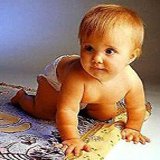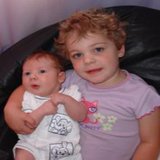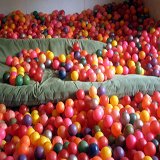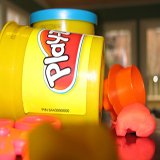Stimulating Child Language Development -
22 Month Old to 24 Month Old
Speech is very much part of your child language development during the 22 month old development to 24 month old development. By the time he reaches his second birthday you child is much more communicative, has a better grasp of vocabulary, grammar and sentence structure, and likes talking to other people.
In particular, he enjoys mixing with other children of his own age, even though they can't always make themselves understood to each other.
Child Language Development
22 - 24 month old
Suitable suggestions for Child Language Development
(22 Month Old - 24 Month Old)
You continue to have a huge influence on your child language development. You will find that he picks up the style of words and sentences you use.
Word Alternatives
Try to make the toddler language development you use with your child basic but varied. Instead of using the same words each time, offer alternatives that have the same meaning.
For instance, the word 'big' could sometimes be replaced by 'huge' or 'large', the word 'nice' could be replaced by 'good' or 'great' - your child takes his cue from you and when he hears you use different word he'll start to do the same as well. This gradually broadens his vocabulary building.
Language Mistakes
Expect your child to make plenty of mistakes with the language he uses - it's a normal part of language development in children. He will mix up words sometimes, get confused occasionally, mispronounce initial letter sounds from time to time, and even make up words and constructions.
Don't correct him when he makes language mistakes or he may become anxious. A more effective strategy is to reiterate what he has tried to say, using the correct words or construction, as if you were agreeing with him rather than pointing out his mistake.
If he watches a dog walk away from him and says, for instance, 'Doggy gone away' you could say 'Yes, that's right. The dog has gone away.' Modeling language in this way shows him how to say words correctly, without weakening his self-confidence.
Understanding Body Language
Your child expects everybody to understand him - he knows what he is trying to say and so he assumes you do as well. And he may explode with frustration when he suddenly thinks that you don't grasp his meaning. The more you ask him to repeat himself, the angrier he becomes.
In this situation, use a variety of strategies. You might decide to distract his attention on to something else altogether, or you could just nod your head as though you have understand exactly what he has said.
Be sure to visit all the child language development pages for different ages.
Read more about the different language development stages.
Top Tips for Child Language Development
(22 Month Old - 24 Month Old)
- Let him speak at mealtimes.
- Play tongue and lip exercises.
- Ask him to make up songs.
- Show him recent family photographs.
- Make occasional 'mistakes' when reading stories.
Whether eating on his own or with the rest of the family, encourage him to chat as he eats. The relaxed atmosphere, coupled with the pleasure of eating, is likely to make him particularly conversational.
Place him in front of a mirror and show him how to wiggle his tongue about, blow through his closed lips, and make; 'p', 'b' and 'd' noises. This improves tongue and lip control.
Play a simple tune without words and suggest that he makes up his own words to accompany it. He may look at you in amazement at first, but once he gets the idea he will have great fun creating his own songs.
He studies photographs very closely when he recognizes people in them, and he loves to see pictures of himself. Use this as a stimulus to talk about the family events and holidays in the pictures, which he may partly remember.
To sharpen his listening skills, read a familiar story to him but change it in one small way (for instance, the name of the family pet) and wait for him to spot your error.
Top Toys for a 22 Month Old - 24 Month Old
- story books
- picture cards of familiar objects
- finger puppets
- cuddly toys
- craft and drawing materials
Be sure to browse through all the language child development pages that is broken down in different age groups.
Read more about the different language development stages.
Find It!
Can't remember where you read something specific? Just type in your search term in the box below and your specific topic will be returned to you instantly.









